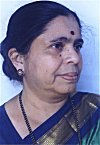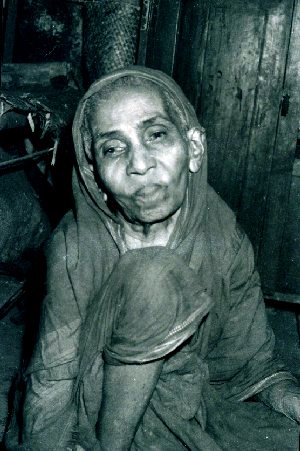Trauma of Widow Tonsure During 1920s
Category:

Jyotsna, who has a Ph.D. in History, has been a teacher (Women's Training College, Dharwad), researcher (Karnatak University, Dharwad), and broadcaster (All India Radio, Dharwad, Bangalore, Mysore, Calcutta, Bombay, Jaipur). She speaks Konkani, Kannada, English, Hindi, Marathi, Bengali, and Sanskrit, has written many books and articles, and has received a number of awards, including Karnataka Literary Academy Award 1988 (for the book Karnatakada Shikshana Parampare), and Rajyotsava Award 1991. A widow, she lives in Bangalore and blogs at http://www.kamat.com/jyotsna/blog/
Editor's note: This article is reproduced from http://www.kamat.com/jyotsna/blog/ with the author's permission. Another story that discusses the shaving of a widow's head is Number 2898, Saraswatipuram by T.S. Nagarajan.
Parvatibai Athavale (1870-1955), sister-in-law of Professor Dhondo Keshav Karve, the great social reformer, was widowed in her 20's. She had to undergo all strictures including tonsure. Later she decided to grow hair to set an example.
She was helping Prof. Karve in running the Widow's Home. Her experiences in this connection are recorded in her autobiography My Story: The Autobiography of a Hindu Widow (English translation of book in Marathi, 1930). Some extracts:-
"Twenty years of my life were spent with a shaven head. I then made up my mind that so far as I was concerned the custom should come to an end. No one advised me in this decision. Prof. Karve had left the question entirely to my own choice. I had no urging from him, nor any encouragement in this matter. His opinion was that each one must settle the question for herself.

While engaged in the work for the widows' home I made thousands of attempts to bring about the cessation of the custom of widows having their heads shaved. In my speeches I pleaded that at least the shaving, if it must be done, should not be done by barbers, but by some member of the family like a brother or son. Those widows who look on the rite of having their hair shaved off as a religious act, if their caste does not come to their aid in demanding that a brother or son should do the shaving, then they should be independent enough to refuse to be shaved by barbers. To aid my attempts I even procured some safety razors for them to use. But I soon realized that it was the widows' belief that being shaven by barbers was the scriptural way, and to be shaven otherwise was a wrong act.
I have had many conversations with widows and I still continue to have them. Their reply in substance is, "Who knows who was the damn author of the custom of shaving widows' heads. It is not even mentioned in the Ramayan or Mahabharat. We do not know whether the custom existed in the Vedic period. We learn from men that it is found in the Laws of Manu. But no one seems to consider that those laws are suitable for the present time.
The barbers are always quite ready for the fortnightly shaving of young widows. But when the widows are over fifty or sixty years of age it is not easy to get barbers to do that work even in such cities as Bombay. If asked by such a widow in the early morning, his reply is, "I don't do such work here by the Bhavani shrine. I will come to your house at noon if you wish." In the villages the widows have great difficulty in securing barbers to shave them, and they have often to be called from a distance. Under such circumstances, widows sometimes have hair several inches long, falling over their eyes and making it possible for relatives to tease them.
"Grandmother! Why is your hair so short? When are you going to braid it? Why do you cover your head with your sari?"
Knowing that unless I set the example I could not expect widows to take a stand against the custom, I paid no attention to the slanders, suspicions and insults that met me in 1912, and continued on the path of my purpose.
It is true that the opinions of people in recent times regarding the shaving of widows' heads are undergoing a change, but in the villages it is changing very slowly. Unless widows themselves take the lead against the unjust custom, which under the name of religion sorely presses upon them, it is going to be very difficult for the Hindu community to be rid of it."
© Jyotsna Kamat 2008
Comments
Add new comment